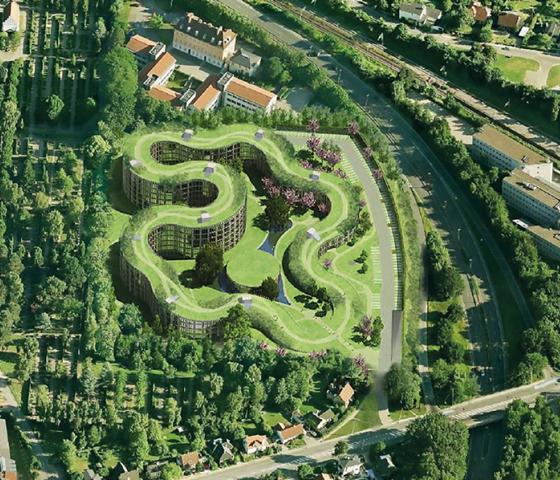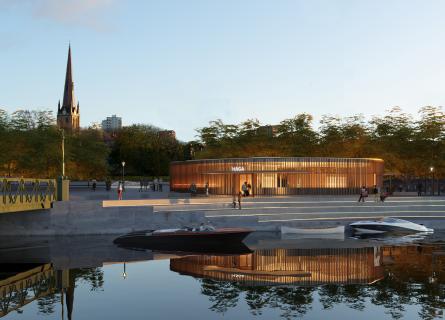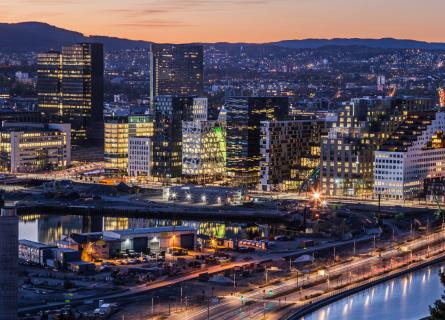
Student housing goes green
Student housing goes green
Public green spaces are often sacrificed as cities expand and develop. But there are ways of tackling housing shortages without detrimental effects on our natural surroundings. Indeed, buildings may contribute to environmental values. Just outside of Copenhagen, AFRY is developing BaseCamp Lyngby – a spectacular student housing complex where nature has been allowed to set the terms.
”To meet the demand for affordable housing for young people, the construction industry usually creates smaller, lower standard housing, using lower quality materials. We think differently and build quality housing, adding value for the general public and the natural surroundings in the process”, says Lars Hagstrøm.
Lars is Scandinavian Development Director of student housing company BaseCamp Student. Together with AFRY and architectural firm Lars Gitz, they are developing a student housing complex in the village of Lyngby, just outside of Copenhagen. In many ways, BaseCamp Lyngby is similar to regular student housing, with individual bedrooms for students and common areas for socialising. But from an architectural perspective, the building is entirely different.
“We had two requests for AFRY and Lars Gitz: the building must be spectacular, and the project should deliver environmental and social benefits. It was important to us to create an open and inviting structure which the students and the people of Lyngby can enjoy”, says Lars.

Rooftop park
The building is expected to be completed in 2020, but as early as 2018, BaseCamp Lyngby was awarded the prestigious Project Prize – one of five annual awards given by Nordic media company Estate Media to influential building projects. The 41,000 square metre building has six rising floors and winds in an undulating shape through the landscape. On the roof there will be a large green park, open for the general public as well as for residents. The intention of creating inclusive spaces where members of different groups in society can meet is something that permeates the entire project. As part of promoting social sustainability, BaseCamp Lyngby will also include a retirement home, where seniors live side by side with the students and share some common areas.
”Lyngby municipality liked the idea of a park open for everyone, not just for residents. This project gives a lot back to the community, whilst preserving nature to a great extent”, continues Lars Hagstrøm.
Contributing to biodiversity
The connection to the landscape is a crucial factor for the project. The inclining 700-metre grass-covered road which leads to the rooftop park reinforces the surrounding nature as the decisive focus of the project.
The park encompasses the building and allows it to blend in with the terrain, creating a cohesive green whole. As consultant engineer throughout the process, AFRY is in charge of ground works, structural engineering and systems design for electricity, water, energy, ventilation, and sewage.
Engineers have focussed on finding solutions that not only minimise the impact on the surroundings, but in fact make a positive contribution.
”By absorbing and conserving rainwater, the green roof reduces the load on the sewage system. Rather than tarmacking roads and parking spaces, we have used pavement slabs with an open structure, allowing grass to grow between the slabs. This preserves the greenery while minimising environmental impact”, says Karl Henrik Elkjær, Senior Project Leader at AFRY.
The rooftop park is the heart of the area – an oasis where animals and plants may thrive alongside human residents.
”We are collaborating with a landscape architect who has suggested providing the park with a diverse range of vegetation, including perennials, trees, and grass. The final proposal is not yet completed, but we intend to create a diverse flora attracting birds and insects, furthering biodiversity”, continues Karl Henrik.
Delivering social and environmental benefits
Communal living is often promoted as an environmentally friendly way to live. When people share communal spaces, washing machines and kitchen utensils, the use of energy and resources is reduced. At the same time, BaseCamp Lyngby supports social values through increased interaction. With today’s growing need for housing and an increased interest in sustainability and a shared economy, co-living can be the answer to future housing challenges. At any rate, BaseCamp Lyngby is a unique and exciting example of what can happen when you combine social and environmental factors and allow them to support each other rather than working against each other.
Our vision is to attract visitors from the entire Copenhagen region and design a social environment that will shape the lives of students and provide the residents of Lyngby with a common place to meet, says Lars Hagstrøm.


